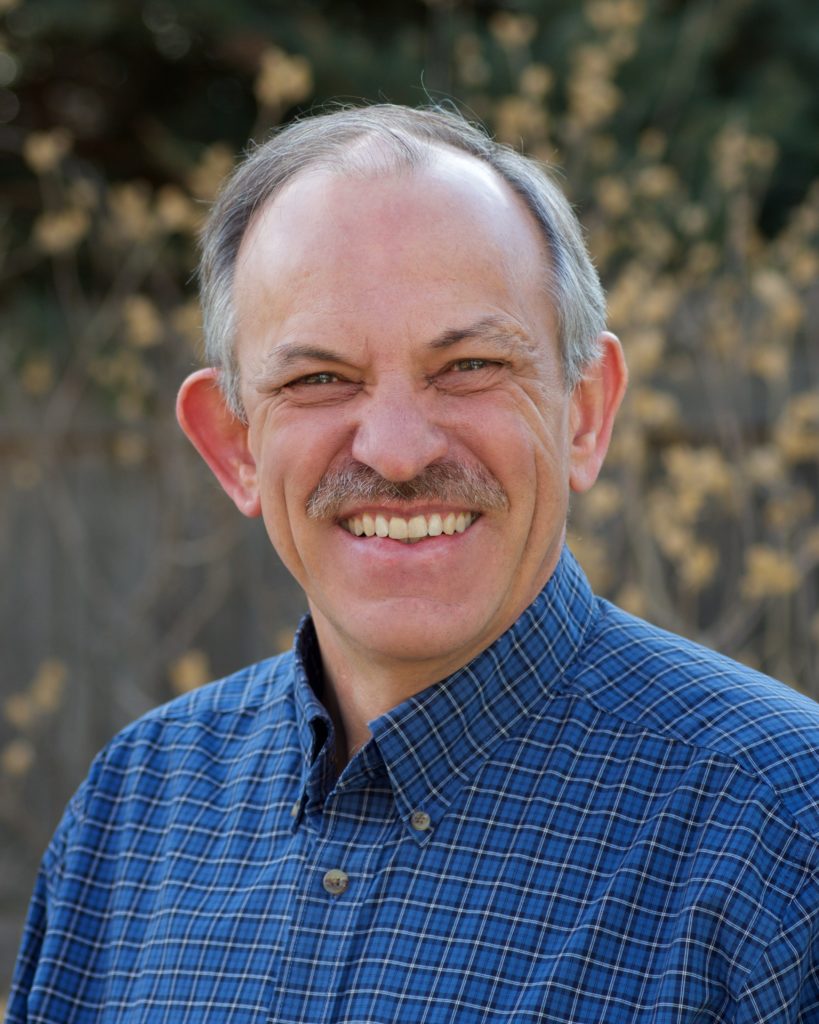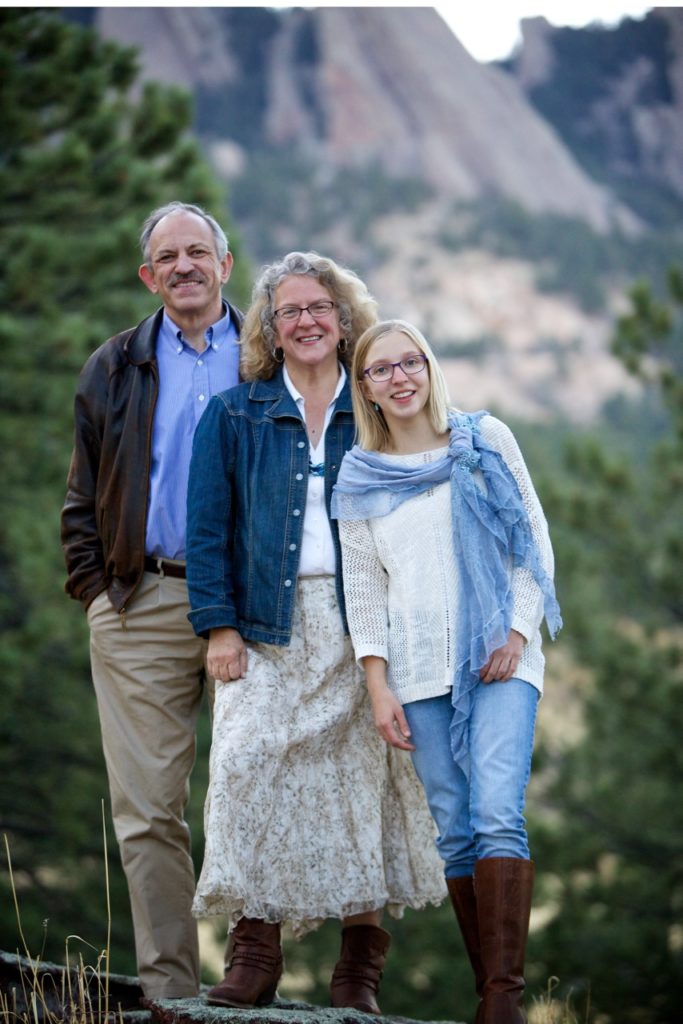Our Stories: Larry Sherwood
by Janet Meyer
So many of us have come to Unitarian Universalism as adults, finding in our faith a refuge, an alternative to others we attended in the past. But among us there are a precious few who are born and raised as UUs. Larry Sherwood is one of those fortunate ones.
Larry was raised in Oakland, California and his family attended the Berkeley Fellowship, which billed itself as a “liberal congregation in a radical community.” As part of their spiritual explorations, the YRUU group visited a variety of other religious communities, including the Hari Krishnas in Haight Ashbury in San Francisco. The sixties were turbulent years for the Bay area, and sometimes his evening youth group activities had to be cancelled due to tear gas from nearby demonstrations.
But largely, his childhood was wholesome and calm. His father was a physician and his mom a dietician. He is the oldest, with a younger brother and sister. Everyone in the family was very involved in scouting, with both parents serving as troop leaders. Larry’s childhood was heavily influenced by his experiences in his diverse and active troop that often camped in the hills above Oakland and backpacked in the Sierras. He eventually earned the rank of Eagle Scout. In 1969, he attended the Jamboree in Idaho with over 50,000 other boy scouts. On Sunday morning, there were church services for all the scouts. The Catholics had thousands in attendance, and the Mormons drew a large crowd, too. All the protestant denominations gathered in various venues. The UUs were a very small group, only about 30 gathered in a nondescript location by a fence. Larry recalls how the service that was held was unlike his usual UU fare – it was remarkably Christian, and even included saying the Lord’s prayer!
However, the unrest of the times did reach the public high school he attended. The superintendent of schools was assassinated by the Symbionese Liberation Army and the ROTC building was bombed. Larry came through the chronically underfunded Oakland Public School system with a good education in spite of these challenges. (Fun fact: Tom Hanks went to his high school, graduating a year before him.) He earned admission to Dartmouth College across the country in Hanover, NH, where he studied engineering. While in college, he got involved in politics and worked on the Mo Udall presidential campaign. This was the era of highly personal campaigns, with lots of phone calls and door knocking. He also enjoyed hiking and backpacking in New England and learning about the local history. Although the local UU church had disbanded before he arrived, a small group of UUs gathered on campus for a short while.
Larry’s freshman year was affected by the Arab oil embargo of 1973, which caused his school to close early in the winter break when they ran out of oil to heat the campus buildings. By the time he graduated in 1977, he was determined to forge a career in solar energy. Of course, at that time there were very few jobs at all in the field. He ended up working as a Vista volunteer in Santa Fe, teaching low income people about using solar to heat their homes and save money. He enjoyed getting to experience the food and culture and people of the area, and even visited the UU church there a few times. Through his work, he met people who became lifelong friends and leaders in the environmental movement. Around this time, Larry decided he wasn’t done with New England. He landed a job at the New England Solar Energy Association, and drove his old VW bug across the country to Brattleboro, VT.
Ten years later, in 1988, he was recruited to head the American Solar Energy Society, based in Boulder. The years of the Reagan administration were very lean years for solar, with deep cuts in government funding and, famously, the removal of the solar panels that Jimmy Carter had installed on the White House. Larry arrived at his new job and found drawers full of unpaid bills in the desk and an organization in bad financial shape. He built the organization back up and got it on stable ground, eventually tripling its membership. ASES was primarily a scientific and academic society dedicated to the promotion of solar energy. They published a magazine, Solar Today, and hosted annual conferences that brought together leaders and stakeholders in the field from around the country, and even the world.
Once he settled in Boulder, he started attending UUCB during the years when Forest was the minister. Coincidentally, the hosts for the new member reception were Paul and Meri Gibb! Although he went regularly, he is astonished that no one ever asked him to serve on committees or do any other work with the congregation! Instead, he got involved with the local and national Sierra Club. He enjoyed taking many interesting biking, hiking, and backpacking trips.
Larry met his wife Janet Meyer through a video dating service (sort of a pre-internet version of match.com!) and they were married on a beautiful sunny day up at Walker Ranch in 1998 by Kurt Kuhwald of UUCB. Their early newlywed bliss was marred by struggles with infertility and illness, culminating in a particularly challenging day – June 15, 2001, the day they learned in the morning that Janet was (finally!) pregnant, and learned that afternoon that Larry had prostate cancer. Navigating their way through the strange roller coaster of emotions and difficult medical appointments, they proved to be a really strong team.
Morgan led them back to UUism in 2009 when she was 7 and in need of some religious education. She felt particularly comfortable at BVUUF, and both Larry and Janet liked it too. Unlike UUCB, the Fellowship quickly took advantage of his skills and talents, and he was soon serving as Treasurer on the Board. Since then, he’s chaired the Capital Campaign Committee, participates in a covenant group, and has brewed many gallons of coffee on Sunday mornings. He appreciates Sunday services as a place of refuge and spiritual recovery from his stressful workweek. He values the Fellowship for the sense of community, meaningful words, beautiful music and commitment to social justice.
Larry is currently the CEO of the Interstate Renewable Energy Council (IREC), a highly respected national renewable energy non-profit. IREC plays a critical role in building the foundation for rapid adoption of clean energy by tackling regulatory, workforce, and economic barriers. For the past year, Larry has been working hard on facilitating their merger with another solar non-profit, effectively doubling the size of his organization and greatly expanding their influence in creating a renewable energy future.
He lives in north Boulder with Janet and enjoys watching sports, running, hiking, and skiing in the Colorado mountains. During Covid, he’s passed the time with his online beer group, countless hours of news and Netflix, reading, jigsaw puzzles, board games, and cards.


